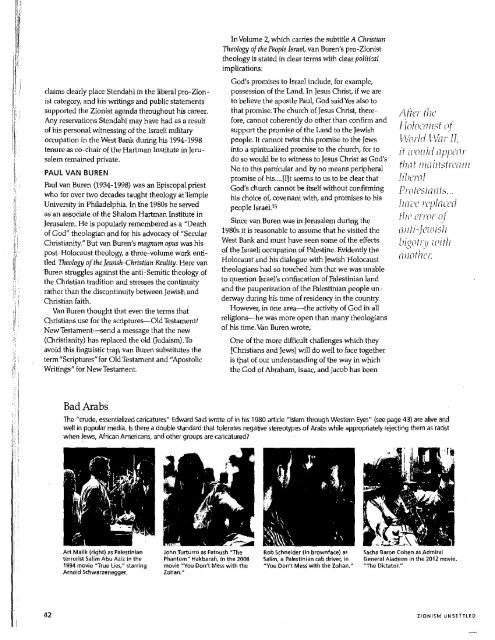zionism_unsettled_scan
zionism_unsettled_scan
zionism_unsettled_scan
You also want an ePaper? Increase the reach of your titles
YUMPU automatically turns print PDFs into web optimized ePapers that Google loves.
In Volume 2, which carries the subtitle A Christian<br />
Theology of the People Israel, van Buren's pro-Zionist<br />
theology is stated in clear terms with clear political<br />
implications:<br />
I:<br />
I<br />
':: '<br />
claims clearly place Stendahl in the liberal pro-Zionist<br />
category, and his writings and public statements<br />
supported the Zionist agenda throughout his career.<br />
Any reservations Stendahl may have had as a result<br />
of his personal witnessing of the Israeli military<br />
occupation in the West Bank during his 1994-1998<br />
tenure as co-chair of the Hartman Institute in Jerusalem<br />
remained private.<br />
PAUL VAN BUREN<br />
fuul van Buren (1934-1998) was an Episcopal priest<br />
who for over two decades taught theology at Temple<br />
University in Philadelphia. In the 1980s he served<br />
as an associate of the Shalom Hartman Institute in<br />
Jerusalem. He is popularly remembered as a "Death<br />
of God". theologian and for his advocacy of "Secular<br />
Christianity.1I But van Buren's magnum opus was his<br />
post-Holocaust theology, a three-volume work entitled<br />
Theology of the Jewish-Christian Reality. Here van<br />
Buren struggles against the anti-Semitic theology of<br />
the Christian tradition and stresses the continuity<br />
rather than the discontinuity between Jewish and<br />
Christian faith.<br />
Van Buren thought that even the terms that<br />
Christians use for the scriptures-Old Testament!<br />
NewTestament-send a message that the new<br />
(Christianity) has replaced the old (Judaism). To<br />
avoid this linguistic trap, van Buren substitutes the<br />
term "Scriptures" for Old Testament and JlApostolic<br />
Writings" for New Testament.<br />
God's promises to Israel include, for example,<br />
possession of the Land. In Jesus Christ, if we are<br />
to believe the apostle fuul, God said Yes also to<br />
that promise. The church of Jesus Christ, therefore,<br />
cannot coherently do other than confirm and<br />
support the promise of the Land to the Jewish<br />
people. It cannot twist this promise to the Jews<br />
into a spiritualized promise to the church, for to<br />
do so would be to witness to Jesus Christ as God's<br />
No to this particular and by no means peripheral<br />
promise of his .... [Ilt seems to us to be clear that<br />
God's church cannot be itself without confirming<br />
his choice of, covenant with, and promises to his<br />
people Israel.15<br />
Since van Buren was in Jerusalem during the<br />
1980s it is reasonable to assume that he visited the<br />
West Bank and must have seen some of the effects<br />
of the Israeli occupation of fulestine. Evidently the<br />
Holocaust and his dialogue with Jewish Holocaust<br />
theologians had so touched him that we was unable<br />
to question Israel's confiscation of Palestinian land<br />
and the pauperization of the fulestinian people underway<br />
during his time of residency in the country.<br />
However, in one area-the activity of God in all<br />
religions-he was more open than many theologians<br />
of his time. Van Buren wrote,<br />
One of the more difficult challenges which they<br />
[Christians and Jews] will do well to face together<br />
is trat of our understanding of the way in which<br />
the God of Abraham, Isaac, and Jacob has been<br />
AticlIIle<br />
fI%en list Or<br />
WOlld lwn lI,<br />
il «('(l/tld OppClll<br />
thot llwinslreolll<br />
/illcm/<br />
Prolcolol1ts ..<br />
/IIlUl'rep/oced<br />
tilt' error of<br />
ollti-Jewish<br />
l1igolnj «(litl!<br />
ollother.<br />
Bad Arabs<br />
The "crude, essentialized caricatures" Edward Said wrote of in his 1980 article "Islam through Western Eyes" (see page 43) are alive and<br />
well in popular media. Is there a double standard that tolerates negabve s1ereotypes of Arabs while appropriately rejecting them as racist<br />
when Jews, African Americans, and other groups are caricatured<br />
,<br />
.1<br />
Art Malik (right) as Palestinian<br />
terrorist Salim Abu Aziz in the<br />
1994 movie "True Lies," starring<br />
Arnold SChwarzenegger.<br />
John Turturro as Fatoush "The<br />
Phantom" Hakbarah, in the 2008<br />
movie "You Don't Mess with the<br />
Zohan."<br />
Rob Schneider (in brownface) as<br />
Salim, a Palestinian cab driver; in<br />
"You Don't Mess with the Zohan."<br />
Sacha Baron Cohen as Admiral<br />
General Aladeen in the 2012 movie,<br />
"The Dictator."<br />
42<br />
ZIONISM UNSETTlED


